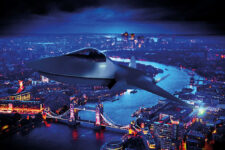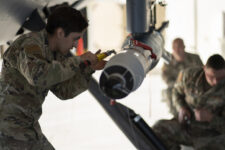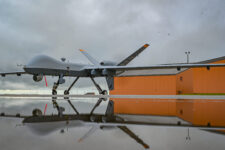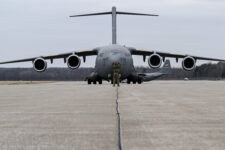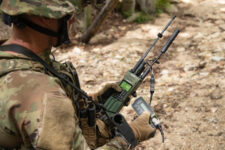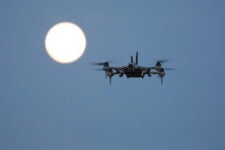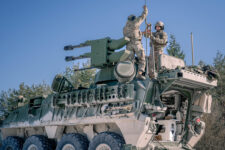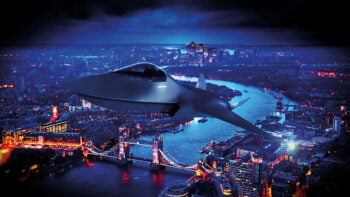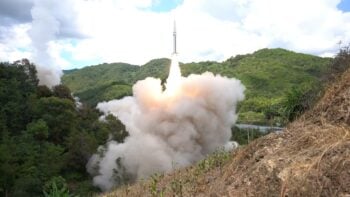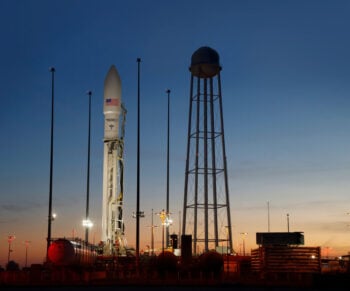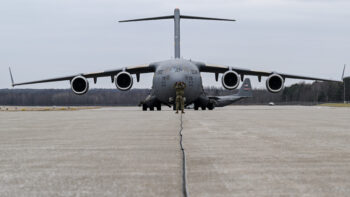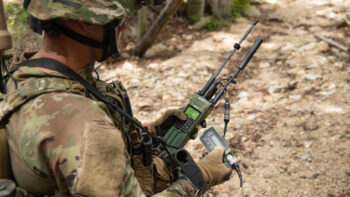
Visitors stand on the booth of the Israeli defense technology company Israel Aerospace Industries (IAI) at the Eurosatory international land and airland defence and security trade fair, in Villepinte, a northern suburb of Paris, on June 13, 2022. (Photo by Emmanuel DUNAND / AFP) (Photo by EMMANUEL DUNAND/AFP via Getty Images)
JERUSALEM — Israel’s Ministry of Defense announced that the country exported $13 billion in defense products in 2023, the third year in a row of record sales for the defense industry here, and an increase of $500 million over 2022 despite the ongoing conflict in Gaza.
The Director General of the Israel Ministry of Defense, Maj. Gen. (Res.) Eyal Zamir, and the Director of the Israel Ministry of Defense’s International Defense Cooperation Directorate (SIBAT), Brig. Gen. (Res.) Yair Kulas announced the record $13.073 in exports on June 17, noting that “Israeli defense exports have doubled within five years.”
“Israel continues succeeding in its international cooperation and industrial defense exports even during a year marked by war. This is a reflection of the capabilities and creativity of our industries and our people,” Israel’s Minister of Defense Yoav Gallant said. “While our industries are primarily focused on providing the defense establishment with the capabilities to support our troops and defend our citizens, they are also continuing to pursue areas of cooperation and exports to international partners.”
Missile, rocket, and air defense systems accounted for slightly over a third of sales at 36 percent. One big chunk is due to Israel’s conclusion of a $3.6 billion deal for the Arrow air defense system with Germany in 2023. The system is made by Israel Aerospace Industries and Arrow was jointly developed with the United States. Finland also acquired David’s Sling, an air defense system also jointly developed with the US and made by Israel’s Rafael Advanced Defense Systems. That deal was worth $345 million.
In 2022 the top export were Israeli UAV and drone systems accounting for 25 percent of sales, whereas in 2023 this dropped to 4 percent [LF: double checking: it dropped BY 4% or TO 4%?]. By contrast missiles, rockets and air defense was a strong sector in 2022 as well, with 19 percent of exports in this group.
Radar and electronic warfare remained relatively the same in 2023 with 11 percent of sales compared to 13 percent in 2022. Vehicles and APCs were the same, only 5 percent, the last two years. Israel also exports weapon stations and launchers (11 percent in 2023), manned aircraft and avionics (9 percent), ammunition and armaments (8 percent), observation and optronics (5 percent), intelligence, information and cyber systems (4 percent), C4I and communication systems (4 percent), satellites and space systems (2 percent), and maritime systems and platforms (1 percent).
In terms of geographic areas of exports, Asia and the Pacific remained the largest sector for Israel, at 48 percent. Europe was second at 35 percent and North America third with 9 percent. Latin America accounted for only 4 percent and Africa for 1 percent.
Israel segments out the Abraham Accords countries, which include the UAE, Bahrain and Morocco. These accounted for only 3 percent of exports in 2023, but they were a whopping 24 percent in 2022. It was not clear what the major change in these numbers reflected. An article at The New Arab noted that the decrease coincided with the Gaza war that began with the Hamas attack on Israel on October 7. However, the war only took place during the fourth quarter of sales, which would not be seen in such a steep change.
More likely, the change reflected a natural ebb tide following several large sales in 2022. Israel only made peace with the Abraham Accords states in 2020, and these countries have only been segmented out since 2021. In 2021 the Abraham Accords countries accounted for 7 percent of exports. This shows the number is volatile for the last several years and there is no clear trend.
In 2022 Israel’s ministry said that the exports come from around 120 Israeli defense companies, and though the ministry did not disclose it this week, Israel likely has a similar number today. The industry in Israel is dominated by three giant defense companies: Elbit Systems, IAI and Rafael. In March 2023, Rafael said orders had surged 85 percent in 2023 compared to 2022 with $8.2 billion in sales. It wasn’t clear how much of this was for export. Elbit Systems said sales in 2023 amounted to $5.97 billion, of which $1.1 billion was in Israel and, therefore, $4.8 billion was for export. IAI said that sales for 2023 were $5.32 billion of which it said $3.79 billion were for export.
The Ministry of Defense said in this week’s statement that it has focused on defense exports as a priority. “The Ministry of Defense led a national effort to strengthen security-strategic relations worldwide, expand defense exports to new markets, remove bureaucratic barriers, and reduce regulation, following Defense Export Control Agency (DECA) regulations and international conventions.” As in the past years, agreements over $100 million make up a large portion of the overall agreements.
“The remarkable achievements of the Israeli defense industries have doubled defense exports within five years. Nations worldwide are recognizing the success of Israeli defense systems, especially in air defense, appreciating their crucial role in safeguarding citizens,” said Director General of the Israel Ministry of Defense, Maj. Gen. (res.) Eyal Zamir. He also noted that in the wake of the October war Israel has invested “billions of dollars” in domestic procurement. This has included items such as munitions. “This strategic approach is expected to further boost our global defense export,” he said.
It remains to be seen how much the conflict in Gaza will affect Israel’s defense exports, both as the nation focuses more on supplying its own military and it begins to feel the affect of international pressure related to the conduct of the war. This year defense firms from Israel were controversially banned from a portion of the Eurosatory defense exhibition — one of the largest arms shows in Europe and a chance to show off their wares to customers.
Finland selects SNC’s RAPCON-X for MVX border surveillance jet program
The pair of new aircraft are set to replace Dornier 228 types, with production out of SNC’s integration center in Hagerstown, Maryland.

